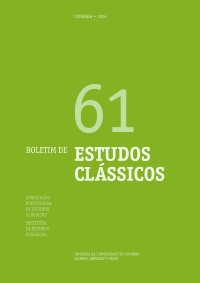Please use this identifier to cite or link to this item:
https://hdl.handle.net/10316.2/42290| DC Field | Value | Language |
|---|---|---|
| dc.contributor.author | Liparotti, Renan Marques | - |
| dc.date.accessioned | 2017-07-11T13:46:46Z | |
| dc.date.accessioned | 2020-09-21T05:30:58Z | - |
| dc.date.available | 2017-07-11T13:46:46Z | |
| dc.date.available | 2020-09-21T05:30:58Z | - |
| dc.date.issued | 2016 | - |
| dc.identifier.issn | 0872-2110 | - |
| dc.identifier.issn | 2183-7260 (PDF) | - |
| dc.identifier.uri | https://hdl.handle.net/10316.2/42290 | - |
| dc.description.abstract | Os discursos A Fortuna ou a Virtude de Alexandre Magno, parte do conjunto das Obras Morais de Plutarco, constituem‑se de um retrato de Alexandre, do qual, destaca‑se, neste estudo, o aspecto do desenho de Alexandre como guerreiro. Para isso, teceu‑se uma análise em contraponto entre a Vida de Alexandre e as obras homéricas, buscando valorizar como nas imagens o Queronês delineia os traços de Alexandre como guerreiro e soma‑lhe as tintas com que Homero colorira Aquiles. Concluiu‑se que, literariamente, ao aproximarmos Alexandre ao Aquiles de Homero, um herói humano, dotado de virtudes e de vícios, aproveitamo‑nos da capacidade plástica do mito e unimos o Macedónio a uma tradição histórica que retrata o herói como falível, capaz de cometer o erro (hamartia), devido a sua fragilidade humana, o que afere responsabilidade por seu declínio. | por |
| dc.description.abstract | The speeches the Fortune or the Virtue of Alexander the Great, part of the overall Plutarch’s Moral Works, are constituted of an Alexander’s portrait, from which, the aspect of Alexander’s draw as a warrior, in this study, is more notable. For this, an analysis was made in contrast with Alexander’s Life and the Homeric works, seeking to enhance how the Chaeronese draws Alexander’s characteristics as a warrior in the images and adds to him the colours which Homer painted Achilles with. It was concluded that, litterarly, as we make Alexader get closer to Homer’s Achilles, a human hero, gifted with virtues and vices, we take advantage of the myth’s plastic capacity and we unite the Macedonian to a historical tradition that shows the hero as a fallible man, capable of comitting the error (amartia), due to human fragility, which explains his decline. | eng |
| dc.language.iso | por | - |
| dc.publisher | Imprensa da Universidade de Coimbra | - |
| dc.rights | open access | - |
| dc.subject | Alexander | eng |
| dc.subject | Achilles | eng |
| dc.subject | Plutarch | eng |
| dc.subject | Homer | eng |
| dc.subject | warrior | eng |
| dc.subject | Alexandre | por |
| dc.subject | Aquiles | por |
| dc.subject | Plutarco | por |
| dc.subject | Homero | por |
| dc.subject | guerreiro | por |
| dc.title | Alexandre e Aquiles: do herói ao humano | por |
| dc.title.alternative | Alexander and Achilles: from the hero to the human | por |
| dc.type | article | - |
| uc.publication.collection | Boletim de Estudos Clássicos vol. 61 | - |
| uc.publication.firstPage | 53 | - |
| uc.publication.lastPage | 65 | - |
| uc.publication.location | Coimbra | - |
| uc.publication.journalTitle | Boletim de Estudos Clássicos | - |
| uc.publication.volume | 61 | por |
| dc.identifier.doi | 10.14195/2183-7260_61_3 | - |
| uc.publication.section | Grego | - |
| uc.publication.orderno | 4 | - |
| uc.publication.area | Artes e Humanidades | - |
| uc.publication.manifest | https://dl.uc.pt/json/iiif/10316.2/42290/229217/manifest?manifest=/json/iiif/10316.2/42290/229217/manifest | - |
| uc.publication.thumbnail | https://dl.uc.pt/retrieve/11438413 | - |
| item.grantfulltext | open | - |
| item.fulltext | With Fulltext | - |
| Appears in Collections: | Boletim de Estudos Clássicos | |
Files in This Item:
| File | Description | Size | Format | |
|---|---|---|---|---|
| alexandre_e_aquiles-_do_heroi_ao_humano.pdf | 272.45 kB | Adobe PDF |  |
Items in DSpace are protected by copyright, with all rights reserved, unless otherwise indicated.
